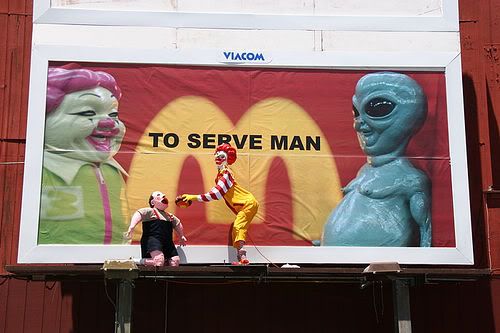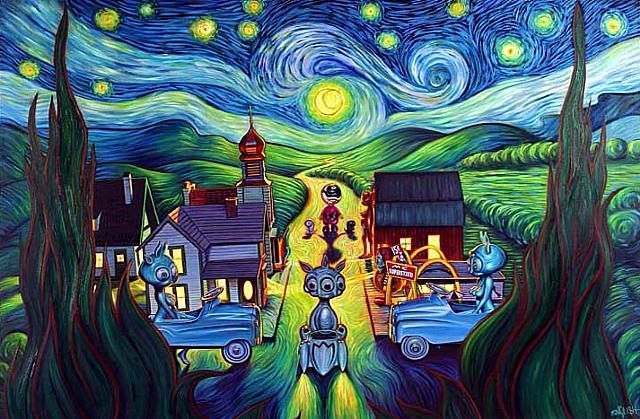Hyper-reality

Billboard Liberation Front, To Serve Man
http://www.billboardliberation.com/ronald.html
Jean Baudrillard and Hyperreality ,b. 1929, Reims, France
simulation:
-the process in which representations of things come to replace the things being represented . . . the representations become more important than the "real thing"
-4 orders of simulation:
1. signs thought of as reflecting reality: re-presenting "objective" truth;
2. signs mask reality: reinforces notion of reality;
3. signs mask the absence of reality;
-Disneyworld
-Watergate
-LA life: jogging, psychotherapy, organic food
4. signs become simulacra - they have no relation to reality; they simulate a simulation
-Spinal Tap
-Cheers bars
-new urbanism
-Starbucks
-the Gulf War was a video game
hyperreality:
-a condition in which "reality" has been replaced by simulacra
-Borges
-Baudrillard argues that today we only experience prepared realities-- edited war footage, meaningless acts of terrorism, the Jerry Springer Show

"Hyperreality is thought to be a consequence of the age that we live in. Hyperrealism is a postmodern philosophy that deals in part with semiotics, or the study of the signs that surround us in everyday life and what they actually mean. For example, a king may wear a crown that symbolizes his title and power. The crown itself is meaningless, but it has come to take on the meaning that society has given it. The reality of the crown and the hyperreality of what it stands for are interwoven.
A popular way of understanding hyperreality is through celebrity culture. Celebrities who reach a point at which every aspect of their lives is taken care of by someone else are said to live in a hyperreal world. They lose the ability to interact with people on a normal level and are cocooned in hyperreality.
Hyperreality can also take the form of reality by proxy, in which a person takes someone else's version of reality on board as his or her own. Some people who watch soap operas for a long time develop a view of interpersonal relationships that is determined by the writers of the soap. The extreme dramatic relationships in soaps are a heightened form of reality that some people relate to as being real. Such people begin to judge social relationships and situations by this heightened reality. They can no longer see the reality of a social situation without relating it to the soap.
More and more people in today’s culture are thought to exist in a state of hyperreality. Media images, the Internet, computer games and virtual worlds are taking people out of the real world more often and for longer periods of time than ever before. Some people may believe that they can be rock stars or celebrities just by acting as if they are.
Hyperreality is exploited in advertising for almost everything. Advertising uses a fake world to define in each person a character that he or she wishes to be. Advertising sells the public an image in the hope that they will buy into their version of a lifestyle that they ultimately desire. Want to be seen as a sex icon? Buy the most expensive jeans as worn or designed by your favorite celebrity. "